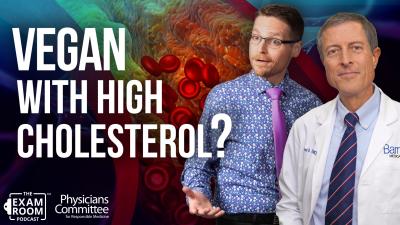The Physicians Committee Sues USDA and DHHS, Exposing Industry Corruption in Dietary Guidelines Decision on Cholesterol
Egg Industry Board Paid Millions in Grants Seeking to Remove Lifesaving Cholesterol Limits
WASHINGTON—The Physicians Committee filed a lawsuit today against the U.S. Department of Agriculture and the Department of Health and Human Services, alleging that the government had allowed the food industry and financial inducements to dictate the Dietary Guidelines Advisory Committee’s (DGAC) new recommendations on cholesterol.
Several DGAC members came from institutions that were funded by the egg industry and relied on egg-industry-funded research findings when they removed limits on dietary cholesterol earlier this year. In allowing this to happen, the USDA and DHHS violated the Federal Advisory Committee Act, which mandates that the advisory committee “will not be inappropriately influenced by the appointing authority or any special interest.”
According to previously unreleased documents obtained by the Physicians Committee under the Freedom of Information Act, the American Egg Board had directly nominated one individual who was then placed on the DGAC. A second member was actively receiving egg-industry research grants according to industry documents, and two others worked at a university that had requested and received more than $100,000 from the American Egg Board for research aimed at challenging the cholesterol limits.
The DGAC then skipped its usual procedure of reviewing scientific studies and dropped the cholesterol limit without an appropriate review of relevant research. Breaking with the Food and Drug Administration and the Institute of Medicine, both of which hold that cholesterol in eggs and other foods increases blood cholesterol levels, the DGAC reported in February 2015 that cholesterol is no longer “a nutrient of concern for overconsumption” and that “available evidence shows no appreciable relationship between consumption of dietary cholesterol and serum cholesterol.”
In violation of federal law, the American Egg Board has made a longstanding effort, costing several million dollars, to change federal policies and make cholesterol appear to be safe. Approximately 90 percent of research studies on dietary cholesterol are now funded by the egg industry.
In a 2013 meta-analysis on dietary cholesterol authored by one of the DGAC members from Tufts University, 92 percent of the studies reviewed were paid for by industry, mainly the egg industry. Nearly every cited study showed that eggs or other cholesterol-containing foods had an unfavorable effect on blood cholesterol levels. However, the review inappropriately concluded that the effect of dietary cholesterol on plasma lipid concentrations “is modest and appears to be limited to population subgroups.”
In 2015, researchers from the same university published a new report paid for by the Egg Nutrition Center, the research arm of the American Egg Board. Nearly every study included in the meta-analysis was funded by the American Egg Board or other industry-related sources. Specifically, 13 of the 15 included studies in the analysis of the effect of dietary cholesterol on LDL cholesterol were industry-funded.
For decades, the Dietary Guidelines have recommended that Americans limit dietary cholesterol to no more than 300 milligrams per day, with further reductions to no more than 200 milligrams per day for persons with or at high risk for cardiovascular disease. Studies clearly show that eggs and other high-cholesterol foods raise blood cholesterol levels. Even a small increase in blood cholesterol, applied population-wide, is likely to increase the number of people dying of heart disease.
The lawsuit states, “Abundant scientific evidence shows that cholesterol is a significant contributor to cardiovascular disease, the leading killer of Americans. The DGAC’s recommendations are part of a 20-year attempt at a cholesterol image makeover based on research funded by USDA’s egg promotion program and designed specifically to increase egg consumption regardless of the health risks that may result from unlimited cholesterol ingestion.”
Two recent studies highlight the dangers of eggs and cholesterol. One in the journal Atherosclerosis found that study participants who ate the most eggs, compared with those who ate the least, had 80 percent higher coronary artery calcium scores, a measure of heart disease risk. A study in the Canadian Journal of Cardiology found that those who consume the most eggs have a 19 percent increased risk for cardiovascular problems.
“Continued cholesterol warnings in the Dietary Guidelines would help protect consumers nationwide from heart disease,” says Ulka Agarwal, M.D., a California physician who is one of the lawsuit’s co-plaintiffs. “The decision could be as potentially lifesaving as California’s Proposition 65, which requires companies to put warnings on potentially cancer-causing products.”
Dr. Agarwal is one of four individuals, in addition to the Physicians Committee, serving as plaintiffs in the lawsuit filed with the United States District Court for the Northern District of California. The others are California physicians John McDougall, M.D., and Donald D. Forrester, M.D.
Physicians Committee president Neal Barnard, M.D., said, “Heart disease will remain America’s leading killer if USDA Sec. Tom Vilsack and HHS Sec. Sylvia Burwell remove disease-preventing cholesterol warnings from the 2015 Dietary Guidelines because of industry-funded pressure.”
Founded in 1985, the Physicians Committee for Responsible Medicine is a nonprofit organization that promotes preventive medicine, conducts clinical research, and encourages higher standards for ethics and effectiveness in education and research.







